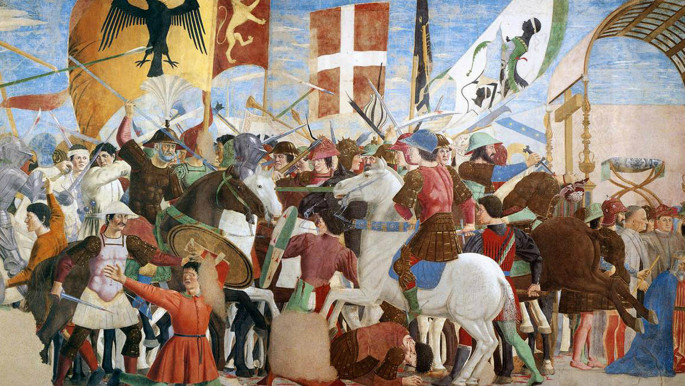The relationship between the state and tribes in Syria
Too often political analysis in academia and journalism focuses on urban elites and trends within the city's limits. While this has told us a great deal, it is often to the neglect of non-urban politics and this can lead to important events being missed. As Dukhan points out the 2011 Syrian revolution differed from Egypt and Tunisia in one important way, tribalism played a critical role in fermenting the early revolutionary movement.
It is not to say other sections of society did not play a significant role, but while scholars have poured over various social groups involved in the uprising and later civil war, the role of tribe and tribal alliances has been overlooked.
To understand the role tribes played in the Syrian conflict, a historical survey of the relationship between state and tribe is necessary, which is where the study begins.
The rise of the Baath party and their ascension to power in the 1960's was disastrous for tribes in Syria, the new national socialist regime sort to take control of lands under tribal control, and redistribute them into the hands of the state itself.
The loss of land and livelihood created a dwindle in tribal numbers in Syria, as many chose to migrant to the Gulf and elsewhere.
 |
As Dukhan points out the 2011 Syrian revolution differed from Egypt and Tunisia in one important way, tribalism played a critical role in fermenting the early revolutionary movement |  |
However, it was Hafez al-Assad's ascension to power that saw a reversal in the state's attitude towards tribe. Assad wanted to use the tribes to hold parts of Syria that the state struggled to control.
Tribes offered Assad more security and greater reach for his regime, as President he cultivated direct ties to tribal leaders, which gave him support that was independent of state institutions.
Assad's source of power within Syria was diverse and his alliances with tribes enabled him to crush the Muslim Brotherhood in the 1980's uprising. Tribes played a critical in fighting the Brotherhood and were even responsible for some of the massacres carried out by the regime against Brotherhood supporters.
Assad also encouraged pride in the Bedouin culture, as Palmyra became the centre of tribal cultural festivals and poetry readings. The television and film industry in Syria began producing dramas and films celebrating rural, Bedouin and tribal stories and characters.
 |
|
|
Read more from The New Arab's Book Club: |
The strong working relationship with tribes that Hafez al-Assad enjoyed, was not inherited by his son, Bashar al-Assad, upon his ascension to presidency.
Bashar had no direct personal ties to the tribes the way his father did and under his reign, he managed to alienate huge swathes of them.
Bashar opened Syria up to economic reforms and neo-liberalism while maintaining an authoritarian regime. Many of the privatising reforms saw state subsidises to tribes cut, land owned by tribes sold off to Alawite businessmen with connections to Assad's family.
Rivalry between different tribal groups increased and clashes between them intensified – it is noteworthy that there were no major inter-tribal clashes under Hafez al-Assad. However, Bashar al-Assad still needed the tribes and the 2003 Iraq invasion was a prime example of this.
 |
Saudi Arabia in particular has invested heavily in certain tribes in Syria and has always done so since the 1950s. Often these tribes act as intermediaries between the Saudi royal family and the Syrian regime |  |
Saddam Hussein was personally quite popular among Syrian tribes in the east of the country. Most tribes have connections to tribes in western Iraq, and Saddam Hussein always played up on his tribal background in official propaganda.
The Hussein regime poured money and resources into Iraqi tribes, something which Syrian tribes could only dream of.
The Assad regime played up on this affinity with Iraq and encouraged the Syrian tribes to cross into Iraq and fight the Americans.
The tribes were also key facilitators and smugglers of weapons, fighters and other resources. The networks setup by the tribes in eastern Syria would later be exploited by the so-called Islamic State group [IS/ISIS].
Tribal politics is also geopolitical as Dukhan's study shows. Syrian tribes are related to tribes in Iraq and much of the Gulf. Saudi Arabia in particular has invested heavily in certain tribes in Syria and has always done so since the 1950s. Often these tribes act as intermediaries between the Saudi royal family and the Syrian regime.
The book is not an exhaustive study of tribal politics in Syria, but it does provide a useful introduction into thinking about how to discuss tribal politics.
One of the main aim of the books is to help facilitate research into tribal politics – an undertaking that is needed – however it is important not to reduce everything to tribe in Syrian politics. The book does not do this and it is not the book's intention to do so. It has contributed greatly to our knowledge and will become a resource on Syrian politics.
Order your copy of State and Tribes in Syria: Informal Alliances and Conflict Patterns here.
Usman Butt is a multimedia television researcher, filmmaker and writer based in London. Usman read International Relations and Arabic Language at the University of Westminster and completed a Master of Arts in Palestine Studies at the University of Exeter.




